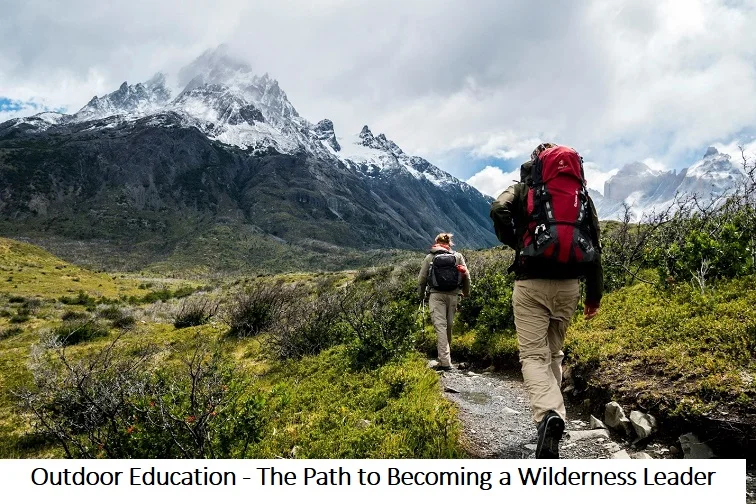+1 845 259 2974 (11 a.m to 7 p.m CST)
Outdoor Education - The Path to Becoming a Wilderness Leader

Outdoor education is gaining prominence as more individuals seek to reconnect with nature and develop essential life skills. Becoming a wilderness leader is a fulfilling path that involves guiding others through outdoor experiences, fostering personal growth, and promoting environmental stewardship. This role requires a combination of formal education, practical experience, and a strong commitment to conservation principles.
For those passionate about the outdoors and interested in leading others, the path to becoming a wilderness leader is both challenging and rewarding. This article outlines the steps to pursue this career. By following these steps, aspiring wilderness leaders can equip themselves with the knowledge and skills necessary to succeed in this impactful field.
1.Pursuing Relevant Education Programs
Formal education is a critical first step for anyone aspiring to become a wilderness leader. Nowadays, education programs offer comprehensive training that covers various aspects of outdoor leadership. These programs provide students with a solid foundation in outdoor skills, environmental science, and leadership techniques. Through a mix of classroom instruction and hands-on fieldwork, students learn how to navigate and survive in the wilderness, lead groups, and manage outdoor activities safely and effectively.
Enrolling in college outdoor education programs is one of the best ways to gain the essential skills needed for this career. These programs often include courses in wilderness medicine, environmental ethics, and outdoor recreation management. They might even provide opportunities for certifications in areas such as Wilderness First Responder and Leave No Trace principles. By participating in such programs, aspiring wilderness leaders can build a robust skill set that prepares them for the demands of the job. Such academic programs, combined with practical experience, are an invaluable step toward becoming a competent and confident wilderness leader.
2.Gaining Practical Experience
While formal education provides the theoretical foundation, practical experience is equally important in becoming a wilderness leader. Engaging in internships, volunteer opportunities, and seasonal jobs in outdoor settings allows aspiring leaders to apply their knowledge in real-world scenarios. This hands-on experience is crucial for developing the skills needed to handle the unpredictable nature of the outdoors and to lead groups effectively.
Practical experience also helps in building confidence and competence in various outdoor activities, such as navigation, survival techniques, and group management. By working with experienced professionals and participating in real outdoor expeditions, aspiring wilderness leaders can learn best practices and gain insights that are not available in a classroom setting. This experience is vital for understanding the challenges of leading groups in the wilderness and for developing the resilience and adaptability required for this role.
3.Building Leadership and Communication Skills
Strong leadership and communication skills are crucial for wilderness leaders. Leading groups in outdoor settings require the ability to make quick decisions, manage group dynamics, and ensure everyone's safety. Developing these skills can be achieved through various means, such as leading group outings, participating in leadership workshops, and engaging in public speaking courses. Effective communication is essential for conveying instructions clearly and maintaining group cohesion.
Moreover, leadership skills are not only about managing others but also about inspiring confidence and trust. Wilderness leaders must be able to handle emergencies calmly, provide guidance, and motivate participants. By honing these skills, aspiring leaders can ensure they are well-prepared to handle the challenges of leading groups in the wilderness. Continuous practice and feedback from peers and mentors can significantly enhance these abilities, making leaders more effective and respected.
4.Understanding Environmental Stewardship
A key responsibility of wilderness leaders is promoting environmental stewardship and conservation. This involves educating participants about the principles of Leave No Trace (LNT) and ensuring that all activities minimize environmental impact. Understanding the local ecosystem and the importance of preserving natural habitats is crucial for any wilderness leader. This knowledge allows leaders to teach participants about the significance of their actions and encourage sustainable practices.
Environmental stewardship goes beyond just following guidelines; it involves fostering a deep respect for nature and instilling this respect in others. Wilderness leaders must lead by example, demonstrating how to enjoy outdoor activities responsibly and ethically. By integrating environmental education into their programs, leaders can help create a generation of outdoor enthusiasts who are committed to protecting the natural world. This role is vital in ensuring that wilderness areas remain pristine for future generations.
5.Maintaining Physical Fitness and Outdoor Skills
Physical fitness and proficiency in outdoor skills are essential components of becoming an effective wilderness leader. Leading groups in rugged environments demand not only physical stamina but also a broad range of technical skills such as navigation, first aid, and survival techniques. Regular physical training and skill development activities are crucial to ensure that wilderness leaders can perform their duties effectively and safely.
Engaging in regular physical activities such as hiking, climbing, and swimming helps build the endurance needed for outdoor leadership. Additionally, participating in advanced courses and workshops on navigation, wilderness first aid, and survival techniques ensures that leaders are well-prepared for any situation they might encounter. Maintaining high levels of physical fitness and continually improving outdoor skills are vital for the safety and success of both the leader and the group.
6.Networking and Professional Development
Networking and continuous professional development are essential for success in the outdoor education field. Joining professional organizations, attending conferences, and participating in online forums can provide valuable opportunities to connect with peers and mentors. These connections can offer support, share job opportunities, and provide insights into the latest industry trends and best practices.
Staying current with professional development also involves seeking out new learning opportunities and certifications. Engaging in workshops, advanced training programs, and specialized courses can help wilderness leaders stay ahead of the curve and enhance their skills. Continuous learning and networking are key components of a successful career in outdoor education, enabling leaders to grow professionally and make meaningful contributions to their field.
Conclusion
The path to becoming a wilderness leader involves a combination of formal education, practical experience, certifications, and continuous professional development. Outdoor education programs provide a solid foundation of skills and knowledge, while hands-on experience helps to build competence and confidence. Developing strong leadership and communication skills, understanding environmental stewardship, and staying connected with the professional community are all essential steps.
















